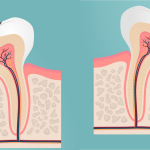7 Tips for Good Oral Hygiene & Healthy Smile
Clean teeth give good oral health. Gum diseases can be prevented by keeping the area clean where the teeth meet the gum. Cavities and gum diseases can be prevented by ensuring the tooth surfaces remains clean as well.
Basic habits of brushing should be considered, such as:
1. Brushing your teeth twice a day:
Don’t hurry, when you brush. Take two to three minutes to do a thorough work of brushing. Do not brush soon after eating, especially having acidic food like grapefruit or soda. Do not neglect to use a toothbrush or tongue scraper to clean your tongue, which inhibits bacteria.
2. Using the appropriate equipment:
Use a toothpaste with fluoride content and a soft-bristled toothbrush that is comfortable to suit your mouth. Try using an electric or battery-operated toothbrush rather than manual brushing, which can help minimize plaque and a mild form of gum disease (gingivitis). These devices are also helpful if you have arthritis or other conditions that make it difficult to brush efficiently.
3. Brushing with proper good techniques:
Keep your toothbrush, at a slight angle pointing the bristles towards the place where your tooth meets your gum. Brush softly with short back-and-forth circular motions. Your gums can get hurt by brushing too hard or with hard bristles. For two minutes, brush your teeth. Do not forget to brush the outside, internal, and chewing surfaces of your teeth, along with your tongue.
4. Keep your equipment clean:
After brushing, always clean your toothbrush with water. Keep your toothbrush in an upright position and leave it to air dry before using it again. To avoid cross-contamination, try to keep it apart from other toothbrushes in the same holder. Do not regularly cover or store toothbrushes in closed containers that can facilitate the growth of bacteria, mold, and yeast.
 5. Replace your toothbrush timely:
5. Replace your toothbrush timely:
If the bristles flay or become irregular, invest in a fresh new toothbrush or replace the head for your electric or battery-operated toothbrush every three months or sooner. Treat flossing as important as brushing With a simple toothbrush, you cannot reach the bacteria in the small spaces between your teeth and under the gum line. That is why regular flossing is important. When you’re flossing:
• Do not skimp.
• Be gentle.
• Take one tooth a time.
• Use an alternative if you are not comfortable with floss.
It does not matter whether you floss or brush first, as long as you do your brushing thoroughly.
6. Important routine tips for better oral health :
Try using a mouthwash containing fluoride to enhance oral health, in addition to regular brushing and flossing. Also, avoid the temptation to use toothpicks or other things that could hurt your gums and allow bacteria to grow in. Try to quit if you smoke. Consuming tobacco raises the risk of many diseases, particularly gum disease and tooth loss.
See your dentist at least twice a year
Your own everyday habits are crucial to your overall oral health. Still, even the most dutiful brushers and flossers need to see a dentist regularly. At a minimum, you should see your dentist for cleanings and checkups twice a year. Not only can a dentist remove calculus and look for cavities, but they will also be able to spot potential issues and offer treatment solutions. Schedule routine dental cleanings and tests that require X-ray examinations to prevent gum disease and other oral health issues. Meanwhile, if you find any signs or symptoms that may indicate oral health issues, contact your dentist, such as:
• Red, tender, or swollen gums
• Bleeding of gums when you brush or floss
• If gums begin to pull away from your teeth
• Loss of permanent teeth
• Unusual sensitivity to hot and cold
• Persistent bad breath or an unusual taste in your mouth
• Pain during chewing
Note, early diagnosis and treatment of gum, teeth, and mouth problems will help to ensure healthy oral health for a lifetime.




